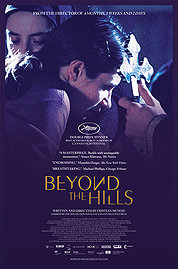|
|||
|---|---|---|---|
| This weekly bulletin insert complements the curriculum published by the Department of Christian Education of the Orthodox Church in America. This and many other Christian Education resources are available at http://dce.oca.org. | |||

Saint Paraskeva was a second-century nun. She traveled from city to city, preaching the faith, until she was denounced to the Roman authorities. After agonizing tortures, she was martyred. The Church of the Three Hierarchs in Jassy, a city in northeastern Romania, is the resting place of the relics of another young nun, Paraskeva of Serbia. This fourteenth-century saint is especially revered by the Romanian Orthodox Church. The tradition of female monasticism in Romania is enduring and spiritually powerful. Romanian film director Cristian Mungiu's movie "Beyond the Hills" doesn't reflect this. In fact, some sections of the movie treat Christian faith and ritual as primitive and superstitious, but Orthodox viewers will at least be impressed by the authentic way in which the daily life of Romanian nuns, living in harmonious community under the authority of an abbess and a priest, is depicted. The young novice Voichita is a central character in the movie. She is an orphan who has found a home in the remote monastery. Life is very basic: the few buildings are of the simplest construction, water is drawn from a well and there is no electricity, though the movie is set in the present day. But the sisters and the priest care for each other, minister to orphans even though they are chronically short of funds, and worship together in their small church with reverence. We first see Voichita meeting her former roommate from the orphanage, who has come to visit, at the train station. Alina embraces her so strenuously that Voichita objects, and it's clear that Alina has a need for her friend's love that Voichita won't be able to meet. As she gently tells Alina, finding God's love has brought her new peace. Her love for her friend is undiminished, but it's different from what it was. Her hope is that Alina can learn to share the peace she has found. Alina cannot accept this. She had hoped to convince Voichita to go with her to Germany to find permanent work. She's upset by her friend's calm insistence that monastic life is satisfying. Though the priest and sisters have received her kindly, Alina's increasingly confrontational behavior and restlessness soon create problems. When Alina's actions become bizarre and physically threatening, the monastics struggle to help her. They get her to the hospital, follow her treatment and take her back to care for her when the doctor says the hospital cannot keep her. Alina's condition deteriorates to the point that the priest reluctantly decides to perform an exorcism, which goes terribly wrong. Some movie reviewers see him as a villain relying on superstition and quackery, and it's true that he and the nuns make deadly mistakes. But their concern is for Alina's salvation. What is the concern of the indifferent secular professionals who sneer at and deride them? "Beyond the Hills" gives a distorted view of Romanian monasticism. We have thriving American monasteries that come from that tradition. Perhaps the movie can inspire us to encourage monastery visits, so that more people can see the tradition for what it really is, and benefit from the spiritual nourishment it offers. |
|||
